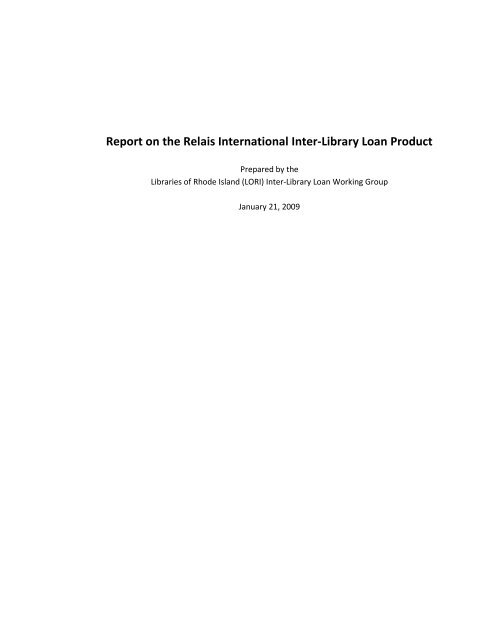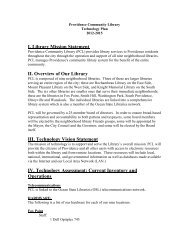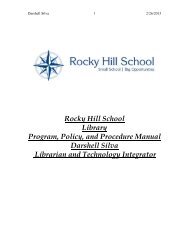Report on the Relais International Inter-Library Loan Product
Report on the Relais International Inter-Library Loan Product
Report on the Relais International Inter-Library Loan Product
Create successful ePaper yourself
Turn your PDF publications into a flip-book with our unique Google optimized e-Paper software.
<str<strong>on</strong>g>Report</str<strong>on</strong>g> <strong>on</strong> <strong>the</strong> <strong>Relais</strong> <strong>Inter</strong>nati<strong>on</strong>al <strong>Inter</strong>-<strong>Library</strong> <strong>Loan</strong> <strong>Product</strong><br />
Prepared by <strong>the</strong><br />
Libraries of Rhode Island (LORI) <strong>Inter</strong>-<strong>Library</strong> <strong>Loan</strong> Working Group<br />
January 21, 2009
Executive Summary<br />
In c<strong>on</strong>juncti<strong>on</strong> with <strong>the</strong> OLIS Network Services, <strong>the</strong> <strong>Library</strong> of Rhode Island <strong>Inter</strong>library <strong>Loan</strong> Working Group has<br />
devoted much of its time seeking an alternative to <strong>the</strong> aging LORI ILL systems that has been in place and<br />
administered by OLIS for more than 10 years. While <strong>the</strong> state is still working toward <strong>the</strong> goal of “One Catalog” for<br />
Rhode Island libraries, resource sharing am<strong>on</strong>g LORI libraries remains critical library services to our patr<strong>on</strong>s.<br />
The group is looking for a system that will facilitate <strong>on</strong>e search interface to <strong>the</strong> three library network catalogs and<br />
an embedded delivery mechanism that will facilitate ILL requests. We approached <strong>Relais</strong> <strong>Inter</strong>nati<strong>on</strong>al in 2007 for<br />
informati<strong>on</strong> about <strong>Relais</strong> Enterprise. In December 2007, a dem<strong>on</strong>strati<strong>on</strong> about <strong>the</strong> product was held in Cranst<strong>on</strong><br />
High School West <strong>Library</strong>. Those who participated found <strong>the</strong> tool very powerful and believe it generally met our<br />
needs for LORI ILL. However, we also realized <strong>the</strong> client-based applicati<strong>on</strong> can potentially be a challenge for<br />
network security in most libraries. Resp<strong>on</strong>ding to Rhode Island’s c<strong>on</strong>cern, <strong>Relais</strong> promised to invest its resources<br />
into developing a complete web-based applicati<strong>on</strong> for <strong>the</strong> same product.<br />
In additi<strong>on</strong> to <strong>Relais</strong> Enterprise, <strong>the</strong> group has reviewed a number of resource sharing soluti<strong>on</strong>s for <strong>the</strong> past three<br />
years including Illiad and Webfeat. The choices are limited and most are cost prohibitive or a challenge to <strong>the</strong><br />
library networks’ administrative capabilities. The group feels <strong>Relais</strong> Enterprise is an ideal resource sharing tool and<br />
ec<strong>on</strong>omically obtainable for LORI Network libraries.<br />
A sec<strong>on</strong>d dem<strong>on</strong>strati<strong>on</strong> by <strong>Relais</strong> <strong>Inter</strong>nati<strong>on</strong>al was held <strong>on</strong> December 9, 2008 <strong>on</strong> <strong>the</strong> Providence College <strong>Library</strong>.<br />
Attending <strong>the</strong> demo were librarians from multi-type libraries and representatives from <strong>the</strong> <strong>Library</strong> Networks. We<br />
had 25 attendees for <strong>the</strong> demo and 17 completed <strong>the</strong> comment sheet. Of <strong>the</strong> 17, 13 answered <strong>the</strong> first questi<strong>on</strong>,<br />
“Would <strong>Relais</strong> Enterprise work better than <strong>the</strong> existing LORI ILL system?” The majority indicated it would fix <strong>the</strong><br />
problems. The sec<strong>on</strong>d questi<strong>on</strong> asked if your library would use <strong>Relais</strong> for more than LORI ILL. Of <strong>the</strong> 14 who<br />
answered this questi<strong>on</strong>, <strong>the</strong> majority indicated <strong>the</strong>y would use <strong>Relais</strong> for most or all <strong>the</strong>ir ILL needs.<br />
Recommendati<strong>on</strong>s for <strong>the</strong> Office of <strong>Library</strong> & Informati<strong>on</strong> Services<br />
1. Negotiate a sustainable c<strong>on</strong>tract with <strong>Relais</strong> <strong>Inter</strong>nati<strong>on</strong>al for a hosted LORI-wide access to <strong>the</strong> <strong>Relais</strong><br />
Enterprise system. The c<strong>on</strong>tract should address <strong>the</strong> following:<br />
Identify <strong>the</strong> type of statistics that will be essential to OLIS and libraries. Incorporate <strong>the</strong>m into <strong>the</strong><br />
canned statistics that <strong>Relais</strong> <strong>Inter</strong>nati<strong>on</strong>al will provide as part of <strong>the</strong> c<strong>on</strong>tract with RI.<br />
Finalize <strong>the</strong> pricing formula for adding new libraries to <strong>the</strong> system as more libraries join <strong>the</strong> LORI<br />
network in <strong>the</strong> coming years<br />
Establish <strong>the</strong> pricing scale per transacti<strong>on</strong> range as <strong>the</strong> usage will go up in <strong>the</strong> future<br />
2. Develop an implementati<strong>on</strong> plan with a designated project manager. This plan should include:<br />
• Training based <strong>on</strong> “train <strong>the</strong> trainer” workshops and follow-up with trainings to every LORI member<br />
library.<br />
• Scheduled switch-off date for OLIS hosted LORI ILL system three m<strong>on</strong>ths after <strong>Relais</strong> Enterprise is fully<br />
c<strong>on</strong>figure and functi<strong>on</strong>al for LORI libraries.<br />
3. Experiment with patr<strong>on</strong> direct access to <strong>Relais</strong> and using <strong>Relais</strong> Enterprise as <strong>on</strong>e stop shop for all ILL<br />
activities with <strong>on</strong>e library from each of <strong>the</strong> three library network and an independent library. Based <strong>on</strong><br />
<strong>the</strong> experience from <strong>the</strong> pilot libraries, c<strong>on</strong>duct a study at <strong>the</strong> end of <strong>the</strong> first year for possible statewide<br />
implementati<strong>on</strong> of such practice. The study should include a funding model to cope with <strong>the</strong> likely fee<br />
1
increase caused by <strong>the</strong> surge of transacti<strong>on</strong>s should <strong>the</strong> state and <strong>the</strong> LORI libraries decide to use <strong>Relais</strong><br />
Enterprise exclusively for all interlibrary activities.<br />
2
Current Situati<strong>on</strong> and Problems<br />
Background<br />
In 2001, <strong>the</strong> <strong>Inter</strong>library <strong>Loan</strong> Working Group was formed and charged by <strong>the</strong> <strong>Library</strong> of Rhode Island Committee<br />
to facilitate <strong>the</strong> improvement of interlibrary loan services am<strong>on</strong>g all LORI libraries. In 2006, <strong>the</strong> charge of <strong>the</strong><br />
Working Group was revised to reflect its new capacity, as an advisory to OLIS <strong>on</strong> ILL policies and procedures.<br />
The working group is made up of representatives from 2 Academic, 2 Public, 1 Health Sciences, 2 School, 1 Special<br />
libraries, representative from <strong>the</strong> Statewide Reference Resource Center, and representatives from <strong>the</strong> three major<br />
Rhode Island library c<strong>on</strong>sortia – HELIN, OSL, and RILINK. A list of <strong>the</strong> LORI ILL Working Group can be found at<br />
Addendum A.<br />
Overview of current ILL activities am<strong>on</strong>g LORI libraries<br />
Currently, <strong>the</strong>re are 180 systems or 212 facilities participating in <strong>the</strong> LORI network. All but 18 libraries bel<strong>on</strong>g to<br />
<strong>on</strong>e of <strong>the</strong> three major library c<strong>on</strong>sortia. The followings are steps taken by libraries when <strong>the</strong> locally accessible<br />
resources are unable to fulfill an item request. These are in additi<strong>on</strong> to requests made through mail, fax, or over<br />
<strong>the</strong> ph<strong>on</strong>e. The steps are also illustrated in <strong>the</strong> flowchart of figure 1 below.<br />
Libraries with Access to One Local <strong>Library</strong> System/Network<br />
Most of <strong>the</strong> public, school and college/university libraries are <strong>on</strong> <strong>on</strong>e system. Libraries search o<strong>the</strong>r<br />
library catalogs to identify potential lending libraries in RI. When <strong>the</strong> item can be found in RI, LORI ILL<br />
forms provided <strong>on</strong> <strong>the</strong> OLIS website are used to request <strong>the</strong> material. When it is necessary to borrow <strong>the</strong><br />
item from out-of-state libraries, <strong>the</strong> requesting library searches for <strong>the</strong> item in FirstSearch and OLIS ILL<br />
Clearinghouse submits <strong>the</strong> ILL request through OCLC <strong>on</strong> behalf of <strong>the</strong> library.<br />
Libraries with Direct Access to OCLC or O<strong>the</strong>r Regi<strong>on</strong>al/Nati<strong>on</strong>al Level ILL Utilities<br />
Academic, health science, and some private school libraries have <strong>the</strong>ir own access to OCLC and o<strong>the</strong>r<br />
nati<strong>on</strong>al ILL utilities and use <strong>the</strong>m to fulfill <strong>the</strong> majority of <strong>the</strong> ILL/Document Delivery requests. However,<br />
<strong>the</strong>y also take advantage of <strong>the</strong> LORI ILL forms when <strong>the</strong> desired item bel<strong>on</strong>gs to ano<strong>the</strong>r LORI library<br />
without direct access to <strong>on</strong>e of <strong>the</strong> nati<strong>on</strong>al or regi<strong>on</strong>al ILL networks. For example, a health science library<br />
will use <strong>the</strong> LORI ILL request system when requesting an item from a public or school library. Since <strong>the</strong><br />
LORI ILL system is <strong>the</strong> <strong>on</strong>ly comm<strong>on</strong> ground between <strong>the</strong> borrowing and <strong>the</strong> lending libraries, <strong>the</strong> LORI ILL<br />
form is used for requests.<br />
The primary regi<strong>on</strong>al/nati<strong>on</strong>al ILL utilities used by Rhode Island libraries include:<br />
OCLC which all libraries use ei<strong>the</strong>r through <strong>the</strong>ir own accounts or <strong>the</strong> OLIS account<br />
DOCLINE for <strong>the</strong> health sciences libraries and most of <strong>the</strong> academic libraries<br />
Brown University also has unique relati<strong>on</strong>ships which include membership in Rapid, Borrow<br />
Direct, and <strong>the</strong> Bost<strong>on</strong> <strong>Library</strong> C<strong>on</strong>sortium<br />
3
Flowchart of ILL Process am<strong>on</strong>g LORI libraries<br />
4
Problems with <strong>the</strong> Current System<br />
The current LORI ILL system requires that ILL staff complete <strong>the</strong> preliminary research about <strong>the</strong> item <strong>the</strong>y intend to<br />
request. Armed with <strong>the</strong> citati<strong>on</strong> and <strong>the</strong> holding libraries informati<strong>on</strong>, staff fills out <strong>the</strong> ILL forms hosted <strong>on</strong> <strong>the</strong><br />
OLIS web site. Once <strong>the</strong> form is submitted, <strong>the</strong> request is sent to <strong>the</strong> lending library’s ILL email. It is up to <strong>the</strong><br />
lending library staff to check <strong>the</strong> email and to resp<strong>on</strong>d to <strong>the</strong> request.<br />
For <strong>the</strong> system to work, it requires that every LORI library diligently checks <strong>the</strong> email <strong>on</strong> a daily basis and resp<strong>on</strong>d<br />
to <strong>the</strong> request/questi<strong>on</strong> in a timely manner. It is a process that is completely separate from most libraries’ ILL<br />
routine. The outcome of <strong>the</strong> LORI ILL is a mix of appreciati<strong>on</strong> and frustrati<strong>on</strong>. The resp<strong>on</strong>se rate and turnaround<br />
time is extremely variable. Experienced ILL staff learns how to weigh <strong>the</strong> choice of <strong>the</strong> lending libraries carefully<br />
based <strong>on</strong> <strong>the</strong> past encounters and make requests to libraries <strong>the</strong>y know have a history of being more resp<strong>on</strong>sive.<br />
However, this also creates an unbalanced lending and borrowing load in <strong>the</strong> system because <strong>the</strong> more resp<strong>on</strong>sive<br />
libraries fill <strong>the</strong> majority of requests.<br />
The problems with <strong>the</strong> current system can be summarized below:<br />
The request is sent via a web form to email. When <strong>the</strong> email becomes undeliverable, no notificati<strong>on</strong> was<br />
sent leaving <strong>the</strong> borrowing libraries w<strong>on</strong>dering if <strong>the</strong> request was even received.<br />
It is up to <strong>the</strong> first library <strong>on</strong> <strong>the</strong> lending string to forward <strong>the</strong> request to <strong>the</strong> next potential lending library via<br />
email. When <strong>the</strong> first library fails to check <strong>the</strong> email, <strong>the</strong> borrowing attempt is terminated prematurely.<br />
The system does not support open URL standards. All citati<strong>on</strong>s have to be entered manually.<br />
There is inadequate tracking for when materials are sent and received. The current process is dependent <strong>on</strong><br />
staff from <strong>the</strong> borrowing library sending a c<strong>on</strong>firmati<strong>on</strong> email to <strong>the</strong> lending library. Not all libraries have<br />
made this a part of <strong>the</strong>ir workflow so c<strong>on</strong>firmati<strong>on</strong> and tracking is not universal.<br />
The ILL form does not work with automatic document delivery systems such as ARIEL or ILLIAD. Document<br />
delivery between LORI libraries still generally requires delivery of hard copy.<br />
LORI ILL is not integrated into individual library’s ILL system and <strong>the</strong>refore requires an added process in <strong>the</strong><br />
ILL workflow.<br />
5
RELAIS Technology and Functi<strong>on</strong>ality<br />
Technology<br />
• Web based access for all patr<strong>on</strong>s<br />
• Web based applicati<strong>on</strong>s for staff (starting January 2009)<br />
• Turnkey soluti<strong>on</strong> or <strong>on</strong>-site hosting are opti<strong>on</strong>s<br />
• Database Technology: SQL server, Oracle, or MDSE (<strong>on</strong>ly available for turnkey soluti<strong>on</strong>)<br />
• Staff Workstati<strong>on</strong> and Scanning Workstati<strong>on</strong> for <strong>the</strong> window client<br />
Operating System 2000/XP ***<br />
Recommended * Minimum **<br />
CPU 1GHz 500MHz<br />
RAM 256MB 128MB<br />
HDD 5GB 5GB<br />
Scanner must have Twain or Kofax compatibility<br />
• Mail Server<br />
The <strong>Relais</strong> ILL software requires access to a SMTP/POP compatible email server. Access should be enabled<br />
to allow <strong>the</strong> <strong>Relais</strong> Applicati<strong>on</strong> PC to relay outgoing messages <strong>on</strong> SMTP, as well as receive incoming<br />
messages <strong>on</strong> POP. The default ports of 25 (SMTP) and 110 (POP) do not have to be used, but should be<br />
made available to <strong>the</strong> installer of <strong>the</strong> <strong>Relais</strong> software, as <strong>the</strong>y will have to enter <strong>the</strong>m into <strong>the</strong><br />
c<strong>on</strong>figurati<strong>on</strong>. Note that <strong>the</strong> mail server can be internal to <strong>the</strong> instituti<strong>on</strong>, or <strong>the</strong> instituti<strong>on</strong>’s <strong>Inter</strong>net<br />
Service Provider.<br />
Pricing<br />
See price quote for specifics. Pricing based <strong>on</strong>:<br />
• One time setup fee<br />
• Annual maintenance fee<br />
• Training fees<br />
• Patr<strong>on</strong> Load fees (opti<strong>on</strong>al)<br />
• Email address (opti<strong>on</strong>al)<br />
Licensing is based <strong>on</strong> 50,000 requests/per year.<br />
General <strong>Product</strong> Functi<strong>on</strong>ality<br />
The product interfaces with <strong>the</strong> following ILL networks:<br />
• OCLC<br />
• Docline<br />
• Ariel (built into <strong>the</strong> product with scanning and does not require separate Ariel stati<strong>on</strong>)<br />
Standards Support<br />
• OpenURL transfers (e.g. from products like SerialsSoluti<strong>on</strong>s)<br />
• ISO 239.50 (Z39.50)<br />
• NCIP<br />
6
Patr<strong>on</strong> functi<strong>on</strong>ality<br />
• Web form to enter requests<br />
• Public interface completely customizable<br />
• Check status of requests<br />
• Cancel requests<br />
• Permissi<strong>on</strong>s for <strong>the</strong> above interface completely customizable<br />
Functi<strong>on</strong>ality with ILS<br />
• Z39.50 search within catalog<br />
• NISO Circulati<strong>on</strong> <strong>Inter</strong>change Program (NCIP) lookup<br />
ILL Operati<strong>on</strong>s<br />
• Routing Lists<br />
• Forwarding as in OCLC or Docline (this is incomplete but under producti<strong>on</strong> and required by BorrowDirect<br />
agreement)<br />
• C<strong>on</strong>nect with III patr<strong>on</strong> database (available summer 2009)<br />
<str<strong>on</strong>g>Report</str<strong>on</strong>g>ing<br />
• Supports access for Crystal <str<strong>on</strong>g>Report</str<strong>on</strong>g>s (or any o<strong>the</strong>r reporting tool supporting SQL)<br />
• 40 Predesigned reports including:<br />
o Usage informati<strong>on</strong><br />
o Copyright c<strong>on</strong>trol<br />
Notices<br />
• Customizable<br />
7
Analysis of Functi<strong>on</strong>s Used for Rhode Island Libraries Implementati<strong>on</strong>s<br />
Functi<strong>on</strong> Req Capable Comments<br />
Access to ILS ILL module Yes* This can place checkout<br />
informati<strong>on</strong> in circulati<strong>on</strong><br />
system for tracking<br />
purposes. However, it <strong>on</strong>ly<br />
interacts with ILL modules<br />
that support ISO ILL.<br />
Allow multiple libraries in<br />
c<strong>on</strong>sortia to view requests<br />
Yes<br />
Yes<br />
Ariel Yes Allow all LORI libraries to<br />
take advantage of Ariel<br />
capabilities<br />
Copyright Statistics<br />
Usage Statistics – In<br />
between c<strong>on</strong>sortia<br />
Usage Statistics - In-state vs.<br />
Out of State<br />
Yes<br />
Yes<br />
Yes<br />
Borrowing<br />
Access patr<strong>on</strong> database Yes* For libraries with ILS that<br />
supports NCIP. Access to III<br />
patr<strong>on</strong> database will be<br />
available in summer 2009.<br />
Allows patr<strong>on</strong> initiated<br />
requests<br />
Allows some libraries to opt<br />
out of patr<strong>on</strong> initiated<br />
requests<br />
Yes<br />
Yes<br />
This can be c<strong>on</strong>trolled by<br />
<strong>the</strong> individual library and<br />
specific items within and<br />
individual item may be<br />
restricted.<br />
Search across catalogs using<br />
multiple vendors to identify<br />
<strong>the</strong> locati<strong>on</strong> of a request<br />
Submit request to Docline<br />
Submit request to OCLC<br />
Yes Yes Using Z39.50<br />
Yes<br />
Yes<br />
8
Supports ISO ILL<br />
Supports OpenURL form<br />
submissi<strong>on</strong>s<br />
Yes<br />
Yes<br />
Lending<br />
Invoicing<br />
Track due dates issue<br />
notices<br />
Yes<br />
Yes<br />
Yes<br />
9
Summary of User Comments<br />
Members of <strong>the</strong> ILL Working Group c<strong>on</strong>tacted 6 existing <strong>Relais</strong> <strong>Inter</strong>nati<strong>on</strong>al customers for comments <strong>on</strong> <strong>the</strong> ILL<br />
product. <strong>Relais</strong> has not had a big share of market in <strong>the</strong> United States. Most of its library customers are in Canada,<br />
Europe, Australia and most recently Asia.<br />
Atlantic Scholarly Informati<strong>on</strong> Network (ASIN) http://www.caul-cbua.ca/visi<strong>on</strong>.html<br />
Nati<strong>on</strong>al Agricultural <strong>Library</strong> (NGL) http://www.nal.usda.gov/<br />
University of British Columbia <strong>Library</strong> (UBC) http://www.library.ubc.ca/<br />
Sim<strong>on</strong> Fraser University <strong>Library</strong> in British Columbia, Canada. http://www.lib.sfu.ca/<br />
Nati<strong>on</strong>al <strong>Library</strong> of Medicine (NLM) http://www.nlm.nih.gov/<br />
British <strong>Library</strong> (BL) http://www.bl.uk/<br />
For <strong>the</strong> purpose of this report, <strong>the</strong> resp<strong>on</strong>ses from <strong>the</strong> libraries are grouped into 4 topic areas. Detailed resp<strong>on</strong>ses<br />
from each library system can be found at Addendum B.<br />
1. Support and Services<br />
All are happy with <strong>the</strong> resp<strong>on</strong>siveness of <strong>the</strong> company to support requests. <strong>Relais</strong> provides an incident<br />
report system which scales incident from Level #1 through Level #3 with #1 being urgent. Typically, most<br />
requests with minor issue were resolved within 1 to 2 hours.<br />
2. <strong>Product</strong> Applicati<strong>on</strong>s<br />
The 6 library systems use <strong>Relais</strong> Enterprise to handle most or all ILL requests. In additi<strong>on</strong> to ILL, <strong>the</strong><br />
University of British Columbia <strong>Library</strong> also uses <strong>the</strong> system to run internal document delivery. The request<br />
is submitted by UBC <strong>Library</strong> cardholders from <strong>the</strong> library catalog.<br />
<strong>Relais</strong> Enterprise is used to interface with a variety of local catalogs, to automate ILL and document<br />
delivery workflow. It is capable of communicating with most ILS systems and n<strong>on</strong>-<strong>Relais</strong> applicati<strong>on</strong> such<br />
as ARIEL and with OCLC through ISO ILL protocols. The Nati<strong>on</strong>al <strong>Library</strong> of Medicine relies <strong>on</strong> <strong>Relais</strong> to<br />
deliver and track requests coming through DocLine, Voyager and o<strong>the</strong>r sources.<br />
3. <strong>Product</strong> Stability<br />
Of <strong>the</strong> 5 library systems hosted locally, down time occurred <strong>on</strong>ly during system upgrade. ASIN who<br />
subscribes to <strong>Relais</strong>’ hosting service since 1999 indicated <strong>the</strong> system was down <strong>on</strong>e time when <strong>Inter</strong>net<br />
access was interrupted by a storm in some areas of Atlantic Provinces.<br />
4. Pros and C<strong>on</strong>s<br />
<strong>Relais</strong> is a str<strong>on</strong>g delivery tool for interlibrary loan. Most said <strong>the</strong> biggest strength is <strong>the</strong> ability to<br />
automate ILL functi<strong>on</strong>s to <strong>the</strong> extent that it improves <strong>the</strong> library’s efficiency and <strong>the</strong> material turnaround<br />
time. Libraries also approve of <strong>Relais</strong>’ relative healthy IT department for product development and<br />
customer support. Of <strong>the</strong> 5 libraries hosting <strong>the</strong> system locally, <strong>the</strong>y all stated that while it is manageable<br />
maintaining <strong>the</strong> system <strong>the</strong>mselves is an enormous task. University of British Columbia <strong>Library</strong> pointed<br />
out that <strong>the</strong> current client architecture make updates time c<strong>on</strong>suming though this will not be an issue<br />
with <strong>the</strong> web interface. And while <strong>Relais</strong> makes customizati<strong>on</strong> possible, some workflows are fixed and <strong>the</strong><br />
library is unable to bypass certain steps in <strong>the</strong> process. For example, <strong>on</strong>e can’t update a request to<br />
“shipped” before <strong>the</strong> request has been printed.<br />
10
Justificati<strong>on</strong> for Adopting <strong>Relais</strong><br />
The ILL Working group recommends moving forward with negotiati<strong>on</strong>s for <strong>the</strong> purchase of <strong>Relais</strong> <strong>Inter</strong>nati<strong>on</strong>al’s<br />
inter-library loan product to replace <strong>the</strong> existing LORI interlibrary loans systems. The <strong>Relais</strong> system resolves all <strong>the</strong><br />
problems associated with <strong>the</strong> old system at a reas<strong>on</strong>able cost. These problems were identified earlier in <strong>the</strong> report<br />
and <strong>the</strong> following is a list of ways <strong>the</strong> <strong>Relais</strong> system addresses <strong>the</strong>se problems:<br />
Automated forwarding of requests so requests do not languish in an email with an unresp<strong>on</strong>sive library.<br />
Forwarding does not require <strong>the</strong> first library in <strong>the</strong> lending string to forward it to <strong>the</strong> next library<br />
<strong>Relais</strong> fully supports open url standards<br />
Tracking of sending and receiving is completed through <strong>the</strong> checkout system and o<strong>the</strong>r functi<strong>on</strong>s<br />
The ILL system works with Ariel, Illiad and Odyssey.<br />
<strong>Relais</strong> can readily integrate with existing ILL systems or even replace <strong>the</strong>m.<br />
O<strong>the</strong>r advantages it has that were not specified by LORI ILL Working group include:<br />
All LORI libraries will be able to receive and send requests to libraries with Ariel stati<strong>on</strong>s<br />
Ability to email Ariel document to customers or allow ftp pick up of items by <strong>the</strong>ir customers<br />
All LORI libraries will have <strong>the</strong> opportunity to maintain and manage all ILL activities in <strong>on</strong>e system<br />
Reduce <strong>the</strong> number of OCLC request at OLIS through better management, <strong>the</strong> use of ISO ILL systems, and<br />
email request for out of state items<br />
The features available in <strong>Relais</strong> <strong>Inter</strong>nati<strong>on</strong>als would reduce staff time required for ILL, shorten turnaround time,<br />
and improve customer service through greater flexibility in customer request and delivery opti<strong>on</strong>s.<br />
11
Addendum A: LORI ILL Work Group Member<br />
Tim Spindler, Roger Williams University <strong>Library</strong>, Chair<br />
Barbara Ashby, RILINK<br />
Joyce Boyd, South County Hospital <strong>Library</strong><br />
Alice Campbell, <strong>the</strong> Redwood <strong>Library</strong> and A<strong>the</strong>naeum<br />
Chaichin Chen, Office of <strong>Library</strong> and Informati<strong>on</strong> Services<br />
Lisa Davis, Ocean State Libraries<br />
Sue Evje, Stadium Elementary School<br />
Beth Grabbert, Cranst<strong>on</strong> High School West<br />
Niles Madsen, Warwick Public <strong>Library</strong><br />
Lisa Maine, Rhode Island College<br />
Adam Misturado, Providence Public <strong>Library</strong><br />
Beatrice Pulliam, Providence College <strong>Library</strong><br />
Jessica Wils<strong>on</strong>, South Kingstown Public <strong>Library</strong><br />
12
Addendum B: <strong>Relais</strong> User Comments<br />
Atlantic Scholarly Informati<strong>on</strong> Network (ASIN) http://www.caul-cbua.ca/visi<strong>on</strong>.html.<br />
This is a fairly large c<strong>on</strong>sortium of academic libraries in <strong>the</strong> Canadian Maritimes. They have been using<br />
<strong>Relais</strong> since 1999 and have had a very positive experience. They are using it as a c<strong>on</strong>sortium routing<br />
requests through <strong>Relais</strong> internally. Unlike OCLC and Docline, <strong>the</strong> routing sequence is not automatic so<br />
when <strong>on</strong>e library receives a request <strong>the</strong>y have to release/move <strong>the</strong> request to <strong>the</strong> next library. Gwyn<br />
Pace, a document delivery librarian in a member library, Dalhousie University, said ASIN libraries did not<br />
want that functi<strong>on</strong>ality. The <strong>on</strong>ly down time <strong>the</strong> librarian can recall was when <strong>the</strong>re was a traffic accident<br />
which brought down <strong>the</strong>ir <strong>Inter</strong>net c<strong>on</strong>necti<strong>on</strong>.<br />
A patr<strong>on</strong> in <strong>the</strong> ASIN libraries initiates an item request and it is routed directly to <strong>the</strong> lending library. An<br />
established procedure allows <strong>the</strong> patr<strong>on</strong>'s library to cancel bad requests and notify <strong>the</strong> lending library<br />
with ease. <strong>Relais</strong> works well with a variety of local catalogs. The system provides and functi<strong>on</strong>s well for<br />
email, ftp, or ARIEL delivery.<br />
Nati<strong>on</strong>al Agricultural <strong>Library</strong> (NGL) http://www.nal.usda.gov/<br />
Overall, NGL has been very pleased with <strong>Relais</strong> for its products and services. The library has been working<br />
with <strong>Relais</strong> since 2000. NGL started with <strong>Relais</strong> ILL Express <strong>the</strong>n moved to ILL Enterprise. The library<br />
experience no downtime except <strong>on</strong>e hour or two when performing upgrades. Wayne Thomps<strong>on</strong> at <strong>the</strong><br />
Document Delivery Services Branch commented <strong>Relais</strong> being very flexible and adaptable. It has really<br />
improved <strong>the</strong> library’s efficiency and turnaround time. It also reduced library’s cost by automating many<br />
functi<strong>on</strong>s. NGL host its own ILL server. A tech savvy staff is needed to m<strong>on</strong>itor <strong>the</strong> complicated system<br />
and to perform upgrades.<br />
NGL is very pleased with <strong>the</strong> support provided by <strong>Relais</strong>. <strong>Relais</strong> has been very resp<strong>on</strong>sive and willing to<br />
work closely with <strong>the</strong> library. <strong>Relais</strong> performed <strong>the</strong> initial installati<strong>on</strong> of <strong>the</strong> system and Thomps<strong>on</strong><br />
thought that is crucial as <strong>the</strong> system is complicated and highly customizable to fit <strong>on</strong>e’s workflow.<br />
Documentati<strong>on</strong> was not great when NGL started to use <strong>the</strong> system but it has improved over <strong>the</strong> years.<br />
University of British Columbia <strong>Library</strong> (UBC) http://www.library.ubc.ca/<br />
UBCL purchased and chose to host <strong>Relais</strong> Enterprise in 2006 and are currently running V2008. UBC use<br />
both OCLC and Docline. The Borrower Services Librarian David Winter was c<strong>on</strong>tacted for informati<strong>on</strong>.<br />
UBC is happy with <strong>Relais</strong> as a product and with <strong>the</strong>ir service.<br />
For questi<strong>on</strong> about <strong>Relais</strong>’ resp<strong>on</strong>siveness to support, Winter said:<br />
“For level two support requests (serious), we get a resp<strong>on</strong>se within a couple of hours, ei<strong>the</strong>r with<br />
a possible soluti<strong>on</strong> or a request for more informati<strong>on</strong>. If we are making modificati<strong>on</strong>s to our<br />
<strong>Relais</strong> envir<strong>on</strong>ment, we usually get a resp<strong>on</strong>se within a day.”<br />
<strong>Relais</strong> has been operati<strong>on</strong>al for almost 2 years without a crash. The <strong>on</strong>ly down times have been UBC<br />
network issues or updating <strong>the</strong> software. UBC uses <strong>Relais</strong> for interlibrary loan and internal document<br />
delivery. Document delivery requests are submitted by UBC library cardholders from <strong>the</strong> catalog. The<br />
request goes directly to <strong>the</strong> owning locati<strong>on</strong>'s print queue, bypassing <strong>the</strong> search functi<strong>on</strong> of <strong>Relais</strong>.<br />
Incoming interlibrary loan requests are routed directly into a print queue or search by staff and <strong>the</strong>n<br />
ei<strong>the</strong>r routed to <strong>the</strong> appropriate locati<strong>on</strong> or cancelled without being printed. Requests can be<br />
automatically cancelled by <strong>Relais</strong> using circulati<strong>on</strong> status from within library’s ILS.<br />
13
Opti<strong>on</strong>s for delivery include post to web, pdf email attachment, printing at multiple locati<strong>on</strong>s, ARIEL, and<br />
Odyssey.<br />
For interlibrary loan borrowing, <strong>the</strong> requests are first searched against UBC catalog. They have <strong>the</strong> opti<strong>on</strong><br />
of canceling <strong>the</strong> request or having <strong>the</strong> request filled by a UBC branch. The library uses <strong>Relais</strong> to<br />
communicate directly with o<strong>the</strong>r Canadian libraries and will be moving towards using <strong>Relais</strong> to<br />
communicate directly with OCLC using <strong>the</strong> ISO ILL protocols shortly. This will eliminate <strong>the</strong> need to<br />
interact with OCLC via <strong>the</strong> web. Incoming articles are handled through <strong>Relais</strong> ReceiveFTP, eliminating <strong>the</strong><br />
need for multiple ARIEL stati<strong>on</strong>s.<br />
Searching UBC and o<strong>the</strong>r libraries catalogs simultaneously from within <strong>Relais</strong> helps reduced <strong>the</strong><br />
processing time for ILL borrowing. UBC creates routing lists of Canadian libraries. The routing lists act in a<br />
similar manner as OCLC, moving <strong>the</strong> request to <strong>the</strong> next library in <strong>the</strong> string.<br />
Winter indicated <strong>the</strong> major inc<strong>on</strong>venience is <strong>the</strong> inability to bypass certain steps in <strong>the</strong> process. For<br />
example, you cannot update a request to shipped before <strong>the</strong> request has been printed. And <strong>the</strong> current<br />
client architecture can make updates time c<strong>on</strong>suming unless <strong>on</strong>e’s ILL office is c<strong>on</strong>solidated in a single<br />
locati<strong>on</strong>. The new web-based interface being developed by <strong>Relais</strong> should eliminate this problem.<br />
Sim<strong>on</strong> Fraser University <strong>Library</strong> in British Columbia, Canada. http://www.lib.sfu.ca/<br />
Sim<strong>on</strong> Fraser University <strong>Library</strong> uses <strong>Relais</strong> Enterprise, exclusively, to handle all ILL requests. The<br />
University has a str<strong>on</strong>g IT department so <strong>the</strong>y chose to host <strong>the</strong> system locally. It has been working fine<br />
with <strong>the</strong>m but Brian Owen, <strong>the</strong> library’s Associate University Librarian, admitted that he would purchase<br />
<strong>the</strong> hosting service from <strong>Relais</strong> if <strong>the</strong>y were to start all over. Having to keep an eye <strong>on</strong> <strong>the</strong> maintenance<br />
and upgrade is no easy task and this is an incredibly complicated system. M<strong>on</strong>ey-wise, Owen said it is<br />
about <strong>the</strong> same for hosted service or locally maintained system.<br />
Sim<strong>on</strong> Fraser University <strong>Library</strong> does not bel<strong>on</strong>g to a c<strong>on</strong>sortium. It works, however, closely with <strong>the</strong> rest<br />
of <strong>the</strong> BC library community which he said <strong>the</strong> majority of <strong>the</strong>m use <strong>Relais</strong>. The library use <strong>Relais</strong> to<br />
communicate with o<strong>the</strong>r <strong>Relais</strong> and n<strong>on</strong>-<strong>Relais</strong> libraries for all ILL requests, including document delivery.<br />
Owen and his staff are happy with <strong>the</strong> product. He said <strong>the</strong> resp<strong>on</strong>siveness is better than average, much<br />
better than any ILS vendor that <strong>the</strong>y have worked with. Because <strong>the</strong> system for Sim<strong>on</strong> Fraser University<br />
<strong>Library</strong> is locally hosted, Owen has extensive c<strong>on</strong>tact with <strong>the</strong> IT unit in <strong>Relais</strong>. Owen indicated though<br />
<strong>Relais</strong> as a company is much smaller in comparis<strong>on</strong> with those giant ILS vendors, it has a bigger and<br />
healthier IT department for product development and support.<br />
Nati<strong>on</strong>al <strong>Library</strong> of Medicine (NLM) http://www.nlm.nih.gov/<br />
NLM is a net lending library. The library uses <strong>Relais</strong> Enterprise as a centralized mean to deliver and track<br />
requests from DocLine, Voyager and o<strong>the</strong>r sources. Lisa Theisen of <strong>the</strong> Collecti<strong>on</strong> Access Secti<strong>on</strong> in NLM<br />
manages <strong>the</strong> <strong>Relais</strong> server locally. <strong>Relais</strong> has been resp<strong>on</strong>sive to <strong>the</strong> library’s requests over <strong>the</strong> years. The<br />
system was down a few times due to <strong>the</strong> NLM internal network problems. When asked about <strong>the</strong> pros<br />
and c<strong>on</strong>s about <strong>the</strong> product, Theisen said maintaining <strong>the</strong> system is no small job. NLM is mostly behind<br />
<strong>on</strong> <strong>the</strong> <strong>Relais</strong> system upgrade. She also pointed out a security c<strong>on</strong>cern due to <strong>the</strong> need to keep <strong>the</strong> client<br />
server logged in at all time. These are offset, however, by <strong>the</strong> helpful features that <strong>Relais</strong> offers. One<br />
feature that <strong>the</strong> NLM staff enjoys <strong>the</strong> most is <strong>the</strong> automati<strong>on</strong>. As Theisen put it, “thing just happens.”<br />
There is room for customizati<strong>on</strong> too. For instance, NLM was able to set up auto-rejecti<strong>on</strong> for secti<strong>on</strong>s of<br />
14
materials that <strong>the</strong> library does not loan.<br />
British <strong>Library</strong> (BL) http://www.bl.uk/<br />
British <strong>Library</strong> uses <strong>Relais</strong> Enterprise to handle most of <strong>the</strong> Document Supply Centre’s request<br />
management and document delivery requirements. The product has been stable. It allows <strong>the</strong> Document<br />
Supply Centre to modernize its services. According to Julian Cann<strong>on</strong> of Systems Development & Testing<br />
Manager, BL uses <strong>Relais</strong> Enterprise as a turnkey system with complex interfacing with o<strong>the</strong>r systems.<br />
Since its implementati<strong>on</strong> with <strong>Relais</strong> Enterprise from more than three years ago, <strong>the</strong> <strong>on</strong>ly down times<br />
were during system upgrades. Cann<strong>on</strong> indicated that <strong>Relais</strong> <strong>Inter</strong>nati<strong>on</strong>al c<strong>on</strong>tinues to fur<strong>the</strong>r develop<br />
enhancements to <strong>the</strong> system. Some of <strong>the</strong>se developments have been made available to <strong>the</strong> <strong>Relais</strong> users’<br />
community. BL has received, over all, satisfactory resp<strong>on</strong>siveness from <strong>Relais</strong> <strong>on</strong> reported incidents.<br />
15
Addendum C: <strong>Relais</strong> Pricing for <strong>Library</strong> of Rhode Island Network<br />
16
Addendum D: <strong>Relais</strong> Demo Comments (Dec. 9, 2008)<br />
Resp<strong>on</strong>ses : 17 completed surveys (not all completely filled out)<br />
Would <strong>Relais</strong> Enterprise work better than <strong>the</strong> existing LORI ILL System?<br />
(1=fix everything to 7=fix nothing)<br />
N=13<br />
Min=2<br />
Max=7<br />
Mean=2.85<br />
Stand. Dev.=1.573<br />
Great majority felt it would fix things (2). (7 was an outlier)<br />
Would your library use this product for:<br />
1=Managing all ILL document delivery needs<br />
2=Only for LORI ILL<br />
3=Would not use<br />
N=14<br />
Min=1<br />
Max=2<br />
Mean=1.29<br />
Stand Dev.=.469<br />
Great majority of resp<strong>on</strong>dents felt <strong>the</strong>y would use this for all <strong>the</strong>ir ILL needs. A few indicated <strong>the</strong>y would<br />
essentially trial it with LORI ILL and <strong>the</strong>n possibly adopt it more fully later.<br />
Comments<br />
“It seems to me we can do everything in our current system that you offer in yours. It is not worse and it is not<br />
better.”<br />
“I think it is great to do away with <strong>the</strong> ILL form (email), so that’s a real advantage. I’m curious though how well this<br />
might complicate work for public libraries/school libraries. Shouldn’t replace holds available through OPAC. “<br />
“It’s obvious <strong>Relais</strong> is a relatively easy system to use and shows some commitment to fur<strong>the</strong>r development.<br />
Appears to be better than present. “<br />
“Pluses<br />
• <str<strong>on</strong>g>Report</str<strong>on</strong>g>s (like clio)<br />
• Show Availability for each library<br />
• Updates circulati<strong>on</strong> with each loan (checks books in & out?)<br />
• OK with Ariel<br />
• Web interface<br />
• Students can track <strong>the</strong>ir own requests<br />
Negatives<br />
17
• No labels (like clio)<br />
• No LVIS/Nelinet searching<br />
• Cost (compared to Millennium plus clio)<br />
• In-house searches (we do not do)<br />
• Wait until new system in place (ano<strong>the</strong>r year?)”<br />
“While it seems to simplify searching for placing requests it also seems to require more staff involvement<br />
regarding routine requests. Client use would be difficult (frequent lack of knowledge of files, no email, etc.)<br />
Would not want to require staff to do processes now automated in Millennium.”<br />
18









![Application for Individuals - English [pdf] - Office of Library and ...](https://img.yumpu.com/24942871/1/190x245/application-for-individuals-english-pdf-office-of-library-and-.jpg?quality=85)

